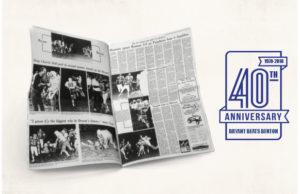When “Go Long” Isn’t The Best Plan

I recently read an article arguing that “Average Arm Quarterbacks” in the NFL were more valuable to their teams than “Big Arm Quarterbacks.” The article first divided a group of well-known quarterbacks into their respective categories (admittedly a subjective task). It placed guys like Matthew Stafford, Cam Newton, and Joe Flacco in the “Big Arm” category. In the “Average Arm” category, it put guys like Tom Brady, Drew Brees, and Eli Manning. It then outlined a full-blown statistical analysis, comparing completion percentages, touchdowns, interceptions, and comeback wins.
The author found that the group of quarterbacks known more for big arm strength tended to be less accurate than those with average arm strength. He concluded that the big arms tended to have a worse touchdown to interception ratio, too. When it came to comeback wins, the quarterbacks known for arm strength were, on average, less efficient than those in the league deemed to have average arm strength. Across the board, the “Average Arm Quarterbacks” beat the “Big Arm Quarterbacks” in every statistical category included in the analysis.
Don’t get me wrong. I’m of the opinion that a smart person can skew a statistical analysis to say almost anything. I also realize that this is all relative. I know that the quarterback with the weakest and least accurate arm in the NFL, whoever that might be, is light-years ahead of the rest of us in the real world. But it is an interesting topic of debate to help football enthusiasts pass the time while they wait for Week One.
This point has an interesting correlation to my field of estate planning. Stick with me. Most people center their plans on one of two possible strategies. They either center their plan on a Last Will and Testament or they utilize a Revocable Trust as the centerpiece of their estate plan.
It would be fair to compare use of a Last Will and Testament to hiring a “Big Arm Quarterback” to lead your football team. The quarterbacks with the big arms (and arguably less accuracy) need better receivers. They chunk the ball and hope that someone happens to be in the right place at the right time to catch it. Sticking with this analogy, you could compare use of a Revocable Trust to hiring an “Average Arm Quarterback” to lead your football team. These (arguably) more accurate quarterbacks do better at adjusting to where their receivers happen to be and provide them more protection against unforeseen obstacles.
When you center your estate plan on a Last Will and Testament, it is difficult to protect your heirs from themselves and others. But that’s exactly what a well-drafted Revocable Trust can do for you. It can protect an inheritance from heirs who may be unprepared to properly manage it. It can protect an inheritance from others who may want a piece of what your heirs have coming.
In other words, the success of an estate plan centered on a Trust does not depend on your heirs being in the right place at the right time. If your heir is disabled when he is to receive his inheritance, a trust can protect him and the funds. If your heir is facing legal troubles like bankruptcy, divorce, or litigation, a trust can shield the funds from the people and entities going after that family member.
The ability to protect your heirs from themselves and others should provide plenty of motivation to center your estate plan on a Trust instead of a Will. But there’s one additional huge factor that seals the deal. A Last Will and Testament will not keep your estate out of probate court. Instead, it’s your set of instructions to the probate judge on how you’d like your probate handled. A well-drafted and properly used Trust will keep you out of probate court.
Probate is a court action supervised by a judge and managed by attorneys that costs a lot of money, takes a frustratingly long time, and is uncomfortably public. Anything you can do to keep your family out of probate is worth it. Because a Trust can do that while also protecting heirs from themselves and others, that’s the recommendation I give to my clients the majority of the time.
If you’d like to learn more about probate, how to avoid it, and how a Trust can protect your heirs, order a copy of my book, You Need A Plan, at YourPlanMatters.com. And remember, a no-charge Strategy Session is just a phone call away. Do your homework and be prepared. ν









0 comments